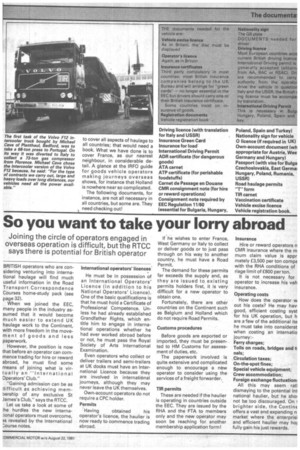So you want to take your lorry abroad
Page 39

If you've noticed an error in this article please click here to report it so we can fix it.
Joining the circle of operators engaged in overseas operation is difficult, but the RTCC says there is potential for British operator
BRITISH operators who are considering venturing into international haulage will find much useful information in the Road Transport Correspondence Courses home-study pack (see page 32).
When we joined the EEC, many people in the industry assumed that it would become much easier to extend UK haulage work to the Continent, with more freedom in the movement of goods and less paperwork.
However, the position is now that before an operator can commence trading for hire or reward abroad, he must find some means of joining what is virtu ally an "International Operators' Club."
"Gaining admission can be as difficult as achieving memdership of any exclusive St James's Club," says the RTCC.
Let us take a look at some of :he hurdles the new interna:ional operators must overcome, 35 revealed by the International 2ourse notes.
International operators' licences He must be in possession of an International Operators' Licence (in addition to his National Operators' Licence). One of the basic qualifications is that he must hold a Certificate of Professional Competence. Unless he had already established Grandfather Rights, which entitle him to engage in international operations whether he had ever worked abroad before or not, he must pass the Royal Society of Arts International Examination.
Even operators who collect or deliver trailers and semi-trailers at UK docks must have an International Licence because they are involved in international journeys, although they may never leave the UK themselves.
Own-account operators do not require a CPC holder.
Permits Having obtained his operator's licence, the haulier is now ready to commence trading abroad. If he wishes to enter France, West Germany or Italy to collect or deliver goods or to just pass through on his way to another country, he must have a Road Permit.
The demand for these permits far exceeds the supply and as they are issued to existing permits holders first, it is very difficult for a new operator to obtain one.
Fortunately, there are other countries on the Continent such as Belgium and Holland which do not require Road Permits.
Customs procedures Before goods are exported or imported, they must be presented to HM Customs for assessment of duties, etc.
The paperwork involved is quite extensive and complicated enough to encourage a new operator to consider using the services of a freight forwarder.
TIR permits These are needed if the haulier is operating in countries outside the EEC. They are issued by the RHA and the FTA to members only and the new operator may soon be reaching for another membership application form! Insurance Hire or reward operators n CMR insurance where the m mum claim value is appr mately £3,500 per ton compe with the RHA conditions of riage limit of £800 per ton.
It is not necessary for operator to increase his veh insurance.
Operating costs
How does the operator w out his costs? He may hay, good, efficient costing syst for his UK operation, but h are a -few of the additional ite he must take into considerat when costing an internatio journey:
Ferry charges; Tolls on roads, bridges and ti nels; . Circulation taxes; On-the-spot fines; Special vehicle equipment; Crew accommodation; Foreign exchange fluctuation: All this may seem ratl dismaying to the potential int national haulier, but he shol not be too discouraged. On 1 brighter side, the ContinE offers a vast and expanding n market where the enterprisi and efficient haulier may hoj fully gain his just rewards.




























































